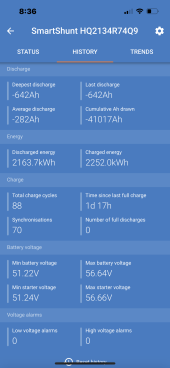I appreciate/identify with you're enthusiasm

However, without specs or tests - I wouldn't make declarations about GroWatt, especially since they don't publish it in their user manual.
Also, just because SolArk says 96% doesn't mean that it's 96% at all charging levels - there's usually some conditions such as % charging and temperature. It could be true for all common conditions but with actual testing....
I'll give you an example. My AIMS inverters list DC -> AC inverting at >88% peak efficiency. The highest I've gotten is 83% at significant % loads (>30% continuous overall loading) and the lowest is 78% at low load (<10%) levels. That's a 5% variation in efficiency based on % load revealed from several years of consistent metrics.
--------------
Merry Christmas to all - off to see the neighborhood lights








